GILDED BERRIES
Making a Good Impression
When I really want to impress some visitor to my garden, I offer a taste of Fallgold raspberries. Here is a fruit that is truly unique in a number of ways.
First, of course, is the flavor. Many raspberries taste good, especially when picked dead ripe and popped right into your mouth, but Fallgold is perhaps the tenderest and sweetest raspberry around. Here’s a berry that you’ll never find on a supermarket shelf; it’s too fragile to travel much further than arm’s length. Good for fresh eating but not freezing or processing. A university publication, while admitting that there’s currently limited commercial use for this variety, it could become a “gourmet item on the fresh market.”
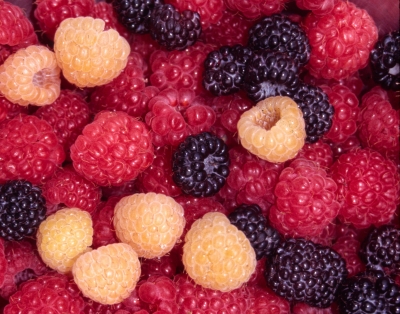
Raspberry kin
Fallgold berries also have a unique appearance. The pale yellow, blushed orange color of the berries seems to speak out their sweetness and tenderness. That golden hue also probably helps hide the fruit from birds, here on the farmden, at least.
Not that Fallgold is the only golden raspberry on the block. There’s also Anne, Double Gold, Yellow Honey, and Goldie. I haven’t tasted all of them, but I’ll bet on Fallgold for the best flavor, quite unique perhaps because one of its parents is Rubus pungent var. oldhamii, a species of raspberry breeder Elwyn Meader found in the mountains of Korea. The one golden raspberry I definitely would avoid is Goldie, which is a sport, or slight mutation, of Heritage, the latter easy to grow but, in my opinion not worth eating.
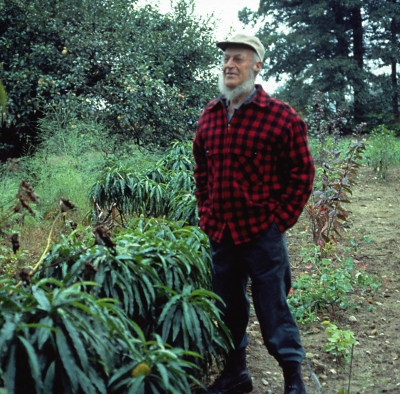
Dr. Elwyn Meader
“Nonstop” Gold
Fallgold’s name speaks to yet another one of the plant’s qualities: it bears in the fall. In this respect, Fallgold is not unique. There are a number of so-called “fallbearing” raspberries, which, along with Fallgold, should be more accurately called “summer and fallbearing” raspberries. These varieties begin their fall crop (it actually begins in late summer) starting at the tips of new canes, with fruit continuing to ripen down the canes until stopped by freezing temperatures.
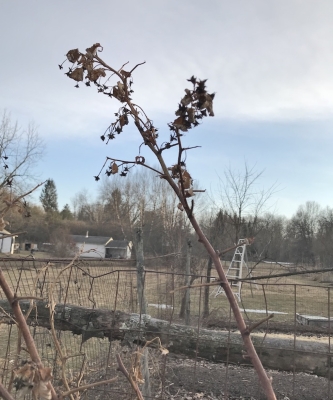
Winter cane showing remnants of late crop; summer fruiting occurs lower down on this cane.
Fallbearing raspberries are sometimes called everbearing raspberries, although they actually bear two crops each season, which can seem close to “everbearing.” The first crop of the season, in midsummer, is borne lower down on canes that grew the previous season. Those canes had begun bearing near their tips the previous late summer and fall.
Knowing where and when these raspberries fruit tells you how to prune them. The easiest way is to just cut the whole planting to the ground early each winter. This method of pruning sacrifices the summer crop, but, besides being a no-brainer, avoids any problems from winter cold or hungry deer.
Two Pruning and Two Harvest Options
It would be a shame to choose this easiest route in pruning Fallgold. Why? Because if you let it bear two crops a season, you suffer only a short hiatus — usually only a couple of weeks or so — from enjoying these delectable berries between the end of the summer crop and the beginning of the second crop. So you get berries from midsummer practically right on into autumn.
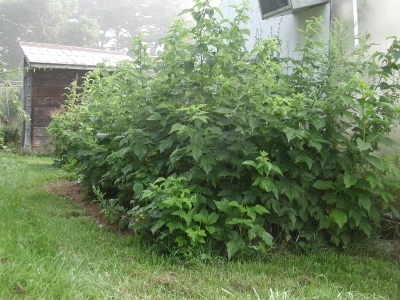
Before pruning
Pruning for two crops is not all that difficult. In winter, or right after the summer crop finishes, cut down to the ground every cane that bore a summer crop.
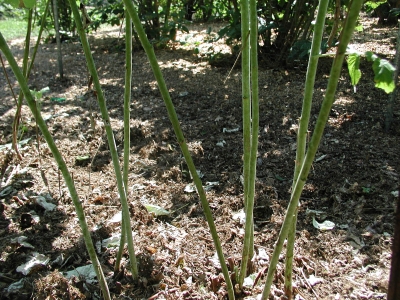
After summer pruning
You can recognize these canes because they show their age with peeling bark.
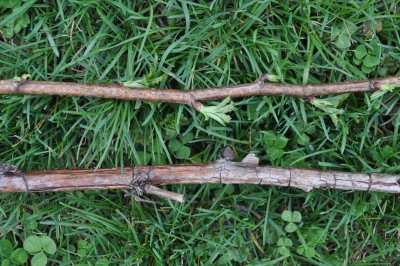
Old vs young raspberry canes in late winter
In winter, go over the planting and cut to the ground enough younger canes so that those that are left are a few inches apart and grow in a swath no wider than twelve inches.
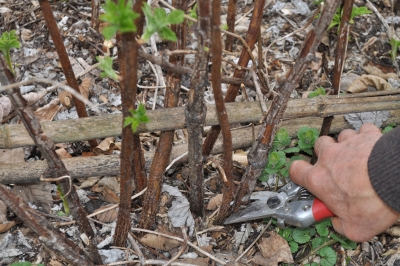
Late winter pruning away of old canes
Selectively remove the thinnest ones.
With Fallgold grown for two crops each season, there’s no need to worry about winter cold damage on those canes that remain. Despite its beauty, sweetness, and tenderness, Fallgold is a tough plant, cold hardy to about minus 25 degrees Fahrenheit.
Don’t fret too much about deer damage either: Deer are not all that fond of raspberry canes and Fallgold will compensate for any canes that are eaten with a subsequent larger late summer and fall crop.
Note: For more about pruning raspberries, see my book, THE PRUNING BOOK.


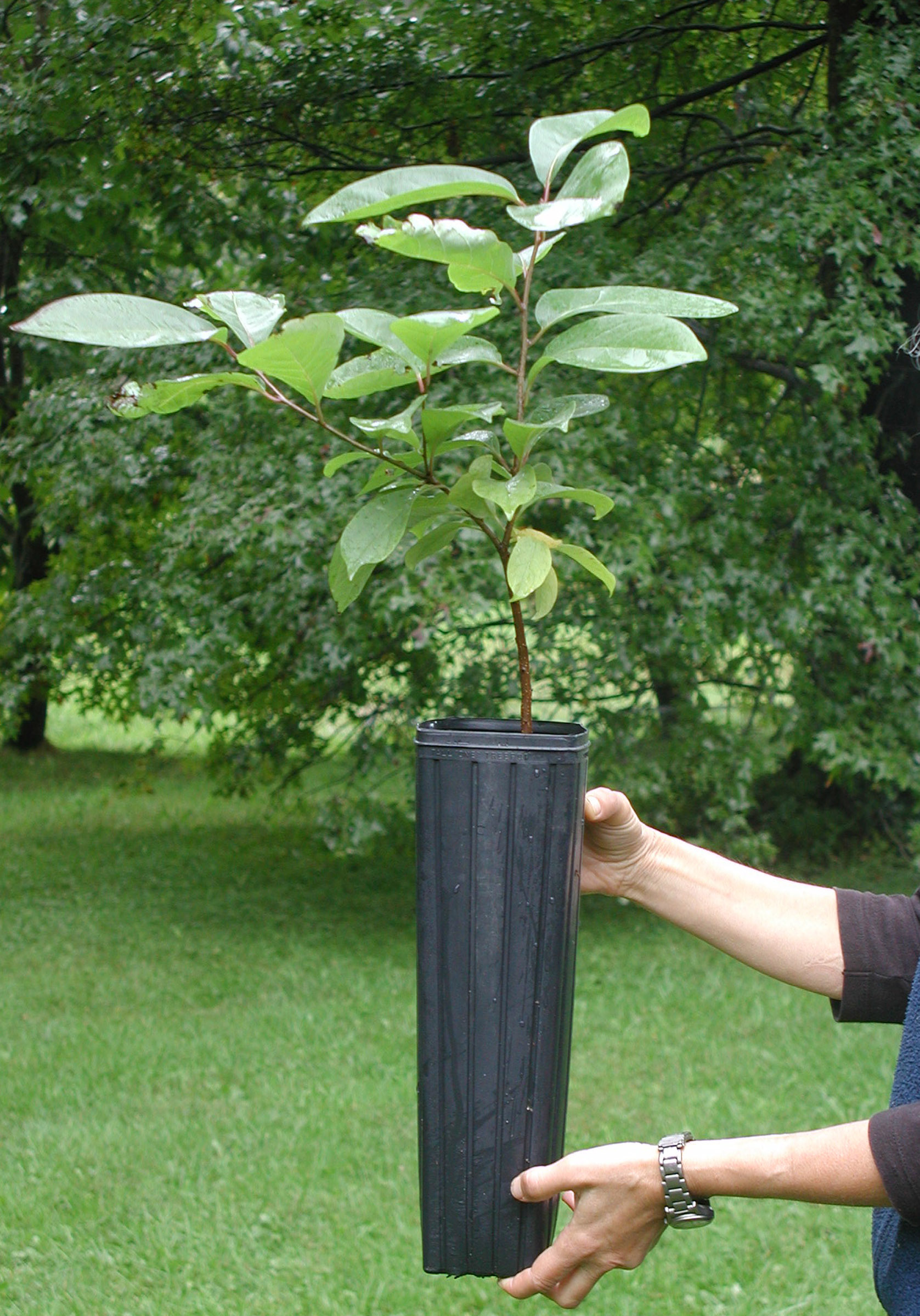
I have to agree with you about Fallgold in all regards. One of the best tasting raspberries I have had. Extremely sweet and tender. Probably the most ‘tropical’ tasting of anything I grow. Most fully red raspberries, while also great at times, don’t come close. The berries do tend to disintegrate while harvesting so that attribute is lamentable. Due to this I decided to plant Double Gold and have been pleased with the more firm texture and close to Fallgold taste. There are 2 raspberries that I may enjoy more. The first is Jewel black raspberry. It’s unique, jammy, complex taste I love. I don’t love its thorns or fruit bearing habit as much, though. Fallgold’s biggest competition for a home gardener for taste and habit may be Crimson Night. I don’t hear much about this variety. It is fallbearing also but the canes take on a slightly ornamental appearance with reddish purple tones. The fruit is tender but holds up to picking and is deeply intense raspberry in flavor with more dark fruit notes. If it is dead ripe and squeezed between the fingers, the juice that is extracted really looks like blood. I tell the kids it’s the vampire blood raspberry when I’m harvesting them as we get into October near Halloween. Thanks for your content! Always a fan.
I’ll give Crimson Night a try next year.
We love Fallgold too but they always disintegrated during the washing process. I have to wash all my berried every harvest as there are little sap sucking black beetle loves to hang out when the berry become just a little too ripe. I have hard time to keep up the daily harvesting… I think I will mow the Raspberry to ground this winter and sacrifice the summer crop. Instead, I could have more time to harvest other berry especially my Blackberry. The Triple Crown is a delicious, vigorous and productive as its name implied.
I will be planting Triple Crown next year. Previously it was too cold here for them, but not these days.
I’m sold. Thanks for the recommendation and great pruning advice!